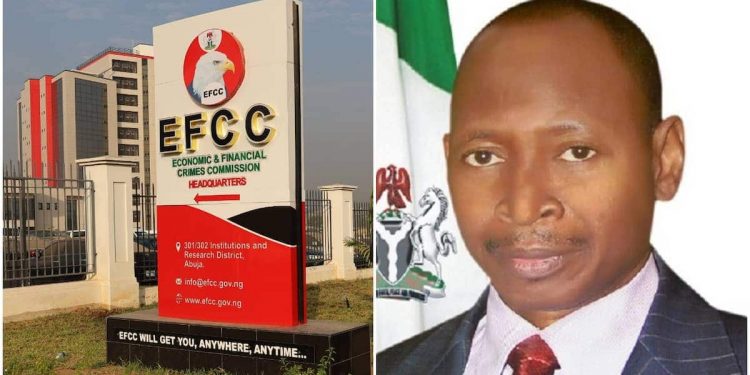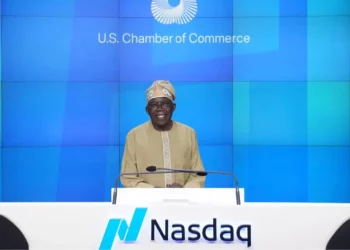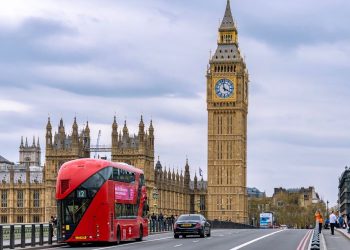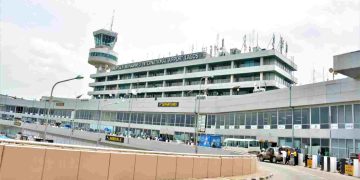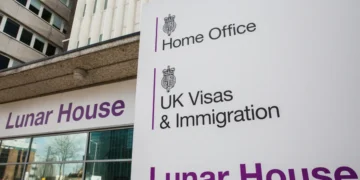CORRUPTION: The counsel to the Economic and financial crimes commission (EFCC), Mr. Rotimi Jacobs told the court Wednesday that the suspended accountant general Idris Ahmed has through a third party sought to meet him to discuss a plea bargain in N109 billion fraud case against him.
Basic Facts
- The counsel to the EFCC told the court Wednesday that Idris Ahmed is seeking a plea bargain.
- The notice/call for plea bargain was made through a third party.
- The plea bargain meeting scheduled for last morning was called off at the instance of the counsel to the accused who protested their exclusion from the bargain.
What We Know
The trial involving suspended accountant general of the Federation, Idris Ahmed and others continued yesterday at the FCT. However, the prosecuting counsel told the court of an impending plea bargain sought by the first accused.
The counsel, Mr. Rotimi Jacobs told the court that meeting would have held on Monday 8th August, but postponed due to a protest by defence counsel of not being carried along.
The defence counsel confirmed the meeting. He also noted that his client was at the EFCC for the scheduled meeting but declined to continue upon invitation to the office of the EFCC Chairman.
The presiding judge, Justice Adeyemi Ajayi, having listen to both sides, adjourned further proceedings on the matter till October 4.
The others standing trial with Idris Ahmed are Godfrey Olusegun Akindele, Mohammed Usman and Gezawa Commodity Markets and Exchange.
Notable Quotes
The EFCC counsel, Rotimi Jacobs told the court that:
“My lord, the defendants sent a third party to me that they wanted a plea bargain meeting and that they wanted to meet me,”
“But my reply to them was that I could not meet them in the absence of their lawyers.
“By the nature of our calling, we must be open and transparent.
“Since section 270 of the Administration of Criminal Justice Act encourages settlement and plea bargaining, I told them to come with their lawyers and that I would also invite the investigators to come for the meeting.”
“One of the lawyers in the team of the first defendant, Mr. Kanayo Okafor, came to my office at the EFCC and protested that they were not carried along and that his client would not come for the meeting,”
“I later spoke with the senior counsel, chief Uche, SAN, for more than 30 minutes over the matter and he protested that we did not invite them.
“It was at that point that I decided to call the meeting off, even though the senior lawyer eventually pleaded that it should go on.
“I called it off because, in the first place, the meeting was at their instance. So, none of the defendants entered the EFCC premises or came for the meeting.”
In his response, defence counsel to the first defendant, Mr. Goddy Uche said:
“My lord, I could not interview my client on Monday as slated because he was at the EFCC [office],”.
“Surprisingly, he was at the EFCC [office] but his lawyers were not carried along. We had thought that one of the prerequisites for charging a matter in court is that the prosecution has concluded its investigations.
“We find it contemptuous that a matter already before the court could be tried in the office of the EFCC chairman. That is not good practice. We were deprived of the opportunity to meet our client to be able to properly prepare for his defence.”
Catch-up
Recall that Clariform in previous reports have been following the case between the EFCC against the suspended accountant general of the Federation, Idris Ahmed, and his co-accused Godfrey Olusegun Akindele, Mohammed Usman and Gezawa Commodity Markets and Exchange.
The accused persons were charged for defrauding the government to the tune of N109 billion. The news of the graft was reported earlier in the year.
Mr. Idris was in May, arrested in Kano after he failed to honour invitations by the EFCC. Mr. Idris was before his arrest, declared wanted to answer questions over an N80 billion naira fraud allegations.
Days after his arrest, Ahmed Idris was suspended indefinitely “without pay” by the minister of finance, budget and national planning, Zainab Ahmed.
Clariform recalls that on July 22, Ahmed Idris and his co-accused were arraigned on a 14-count charge alongside.
However, on the 28th July, Justice Adeyemi Ajayi of the federal High court, Maitama, Abuja, granted him a very liberal bail of N5 billion and two sureties in like sum. The co-accused were also granted bail to the tune of N2 billion each and two sureties in like sum.
The court also warned them against travelling outside of the country without permission of the court or procurement of another passport. Their travel passports were seized by the court.
Takeaway
With a plea bargain in sight, the EFCC can beat it chest to having scored a point in the fight against corruption.
As a plea bargain rarely comes except an accused is faced with overwhelming evidence that would make conviction a done deal.
For the avoidance of doubt, a plea bargain in a criminal proceedings is an agreement between defendant(s)/an accused and prosecutors in which defendants agree to plead guilty to the charges against them in exchange for lesser penalties/outcome. With plea bargain, justice can be tempered with clemency.
However, in a plea bargain, the prosecutor must not come beggarly as though they are in a hurry to dispense of the case with little or no justice served. What this means is that, unlike in previous plea bargains with the EFCC, what the accused usually forfeited has been fraught with controversy.
The accused must not be seen to have walked away victorious by forfeiting a small fraction of the loot. Here, the anti-graft agency must be firm in her negotiations.
A case where the accused keeps up to or more than 50% of the benefits of fraud cannot be a deterrent to others. If anything, all the accused should get is a reduced jail term while forfeiting all pecuniary benefits of graft. This is the only way the point score by the EFCC can be weighty and meaningful to taxpayers.


